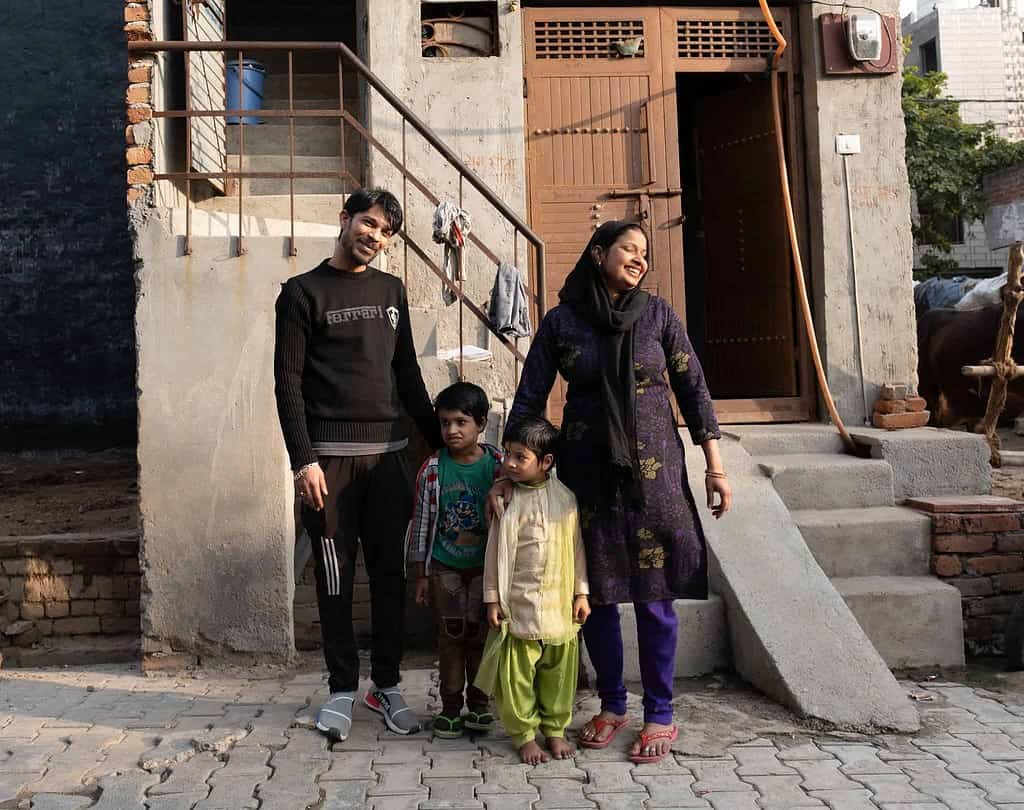Housing with Dignity: This women’s trade union is helping low-income Indian women become homeowners
- Blog
- Housing
- India

In a brightly lit room with intricately tiled walls, Khaniben prepares for the day as she beams with pride while talking about her home. A fruit seller by profession, she readies her boxes to pick up apples from the market to sell as she tells us about her past and present living conditions. “We used to live in our old house which was in really bad shape. We weren’t able to live properly. During the monsoon, it would fill up with water and we would spend nights exhausted getting the water out. But now, with SEWA’s help, our house is made, and we are able to live very happily.” Khaniben is one of thousands of women whose lives have been impacted by Sitara (formerly SEWA Grih Rin Ltd), an initiative started by SEWA, an Acumen investment, providing affordable housing finance to low-income households.
SEWA (Self-Employed Women’s Association), a social enterprise based in New Delhi, India, was founded in 1972 as a women’s trade union and eventually grew into a social movement. It now provides a variety of economic services to its members. In an effort to mobilize the self-employed female workforce, the organization’s founder, Ela Bhatt, organized women of different trades in the informal sector and gave them an institutional platform to advocate for their rights and build institutions to fulfill a variety of financial needs. Out of the trade union, SEWA Bank was formed as an urban cooperative credit union comprised primarily of women from the low-income informal sector.
As the organization grew, so did the realization that most of the women’s money was being used to repair homes in order to make habitable and functional households—spaces where they could not only live, but also conduct business.
The need for easy home loan applications and affordable financing for workers in the informal sector began to grow as urbanization escalated. People from rural areas started migrating to cities in search of work and began setting up in small, informal dwellings on unowned land. Gradually, local governments started to take notice and thought it would be best to formalize the communities into authorized colonies. However, the understanding wasn’t so simple for the informal workers in these areas, mostly populated by people working as vegetable vendors, street vendors, domestic help, and construction workers. The nature of their occupations left them with little money and the government involvement would often leave them with little information, confused and scared about the future of their home ownership.
SEWA Bank realized their members needed more support to navigate this dynamic. It was then that the organization’s purpose shifted and Sitara stepped in to simplify the formal home ownership process. With the help of Sitara’s loan officers, women in the informal sector are given the opportunity to apply for loans based on the total household income. These individuals, who often have a hard time completing loan applications due to limited finances and formal documentation, are able to use the loan to purchase property and become official homeowners.
“With property ownership, we are trying to address not only the safety aspect of having a proper dwelling unit but also empowering these women to build a household to secure the future of her family,” said Shruti Gonsalves, the CEO of Sitara.
Over the last few years of her tenure, Shrutiben has also seen a rise in formal education for children within Sitara-assisted communities. Historically, girls aren’t given as many opportunities for learning as their male siblings and young women are often married as soon as they come of age. However, with new financial opportunities provided by organizations like Sitara, women are beginning to envision new and alternative paths forward. Shrutiben mentions, “This kind of empowerment and the ability to voice their needs and demands come with the ownership of the land and the property title. It gives them a sense of dignity, which is very important to all our women.”
The loans provide a path toward equality for women as men are no longer the sole property owner for every household. “It is because of the woman that the money for the house has come in. She feels pride in knowing that she made this possible for her family. It’s not only about economic independence but also about the ability to make their own decisions.”
Today, Sitara has 24 branches across India and has reached out to 5,800 women. Shrutiben says, “My dream for women in India is to be able to acquire new skills, have access to good education, and have complete control over their life choices.”
Acumen first invested in SEWA Grih Rin in 2014.